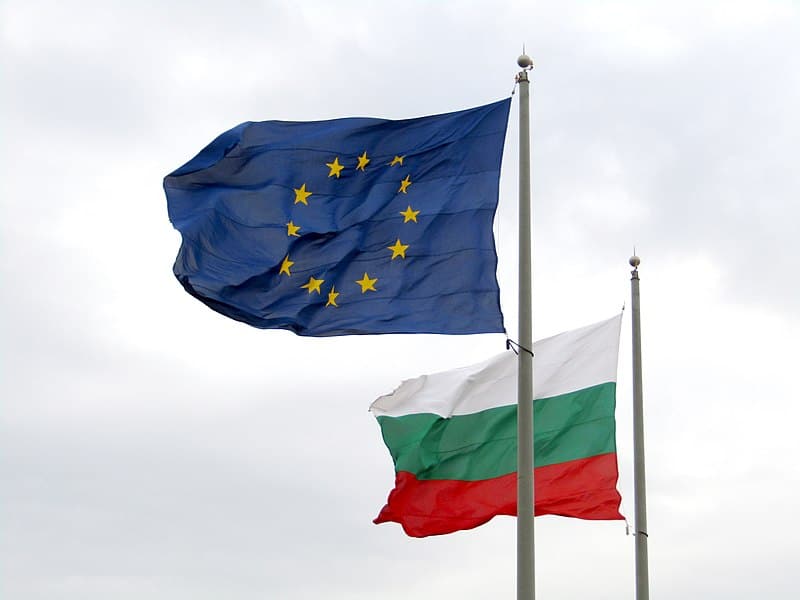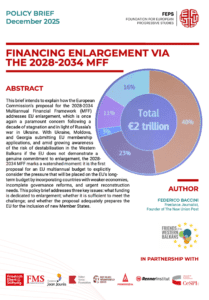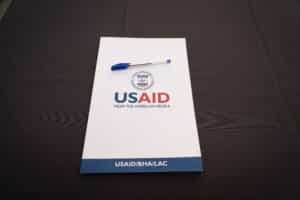Photo: Flag of the European Union and Bulgaria – Wikimedia Commons
On August 7, the Bulgarian parliament overwhelmingly approved a bill that would ban all “LGBTQ+ propaganda” in schools. This law bans any form of education that deviates from the so-called ‘traditional’ sexual orientation. Submitted by the pro-Russian political party Vazrazhdane (“revival”), this bill is in line with similar proposals that have been approved in the past by countries such as Russia and Hungary. This has led, for example, to LGBTQ+ individuals in Hungary only being shown on TV very late in the day so that children cannot be exposed to them. Even more recently, in June of this year, Georgia also passed a similar bill, banning everything regarding Pride in the country. Bulgaria is only the most recent country to be added to the list of countries that are restricting LGBTQ+ rights.
Of course, in and of themselves, these are already very worrying developments, but in Bulgaria this is also happening against a background of deep political division. Soon, already the seventh parliamentary election since 2021 will be held. This is a result of the fact that the different political parties were constantly unable to form a new government, and the few time that they did manage to form one, it already fell apart again after a few months. This has also had obvious consequences for the amount of confidence people have in their politicians. In the last election, on June 9, for example, turnout was just over one-third of the total number of eligible voters, whereas three years earlier it was more than half of all eligible voters. On top of this, Bulgaria has long been plagued by corruption scandals. In 2020, this even led to huge protests against the government led by Prime Minister Boyko Borisov, who was suspected, among other things, of having strong connections to important oligarchs.
It therefore remains to be seen what effect the new law banning LGBTQ+ expressions will have on the already fragile confidence of the Bulgarian population.
The Kremlin looks on happily
It is not a coincidence that a pro-Russian party proposed the law to restrict the freedom of LGBTQ+ people. Not only is this in line with the thinking of the Kremlin, which had already implemented radical restrictions on the rights of LGBTQ+ people in 2013, but in addition, it continues the division in the Bulgarian political spectrum. This benefits Russia, which has an ally in the Bulgarian parliament with pro-Russia leaning President Rumen Radev, who has for example tried time and again to block support for Ukraine. As long as the political parties cannot form a government, Radev is in the position of always appointing a caretaker government with which he can assert his influence on the country’s policies.
Although a majority in the Bulgarian parliament is pro-Europe, this law creates a bifurcation between the conservative and more progressive branches of this group. For example, the progressive coalition PP-DB has vehemently opposed the restriction of LGBTQ+ rights, while the center-right GERB massively agreed to the law in an attempt counter so-called “left-wing ideologies”. In 2023, these parties were united in a government with a pro-European and anti-corruption agenda, but it unfortunately fell apart after only a few months. This law, which divides the pro-European camp, only makes it more difficult to achieve similar cooperation again after the upcoming election.
In addition, a party like GERB is only hurting itself by supporting this bill. Research by the Robert Schuman Foundation shows that people in Bulgaria already have a tendency to be less critical of Russia than other countries in the region. This is partly because of the relative large distance between Bulgaria and Russia, but also because of the distrust people have for the EU and the negative attention the EU gets in the media. It is therefore important for pro-European parties to speak out against this. Adopting a bill inspired by a Russian law and also proposed by a pro-Russian party only leads to more distrust of the EU and less criticism of Russia.
The distance to Europe is growing
It is, therefore, no surprise that many citizens have little trust in their politicians. The different political different parties are not trying hard enough to compromise in order to form a good and reliable government. In addition, it seems that politicians are more concerned with themselves and their political opponents than with their citizens and the country’s best interest. This can have very serious consequences if nothing is done about it, not only for LGBTQ+ persons, but also for the rest of the country.
Amnesty International has researched the impact of the ban on LGBTQ+ representation that Hungary introduced in 2021. They conclude that this has led to both censorship and self-censorship in the public sphere. This, in turn, has led to increased prejudice and discrimination against LGBTQ+ people. Of course, it remains to be seen whether the exact same thing would happen in Bulgaria, but it would not be a surprise if the level of stigma and discrimination will increase. On top of this, the pro-Russian party that proposed the bill argues that LGBTQ+ propaganda comes from the West and is also trying to distance itself more from Europe with this law. Thus, by agreeing to this proposal, GERB undermines its pro-European views.
So why is GERB agreeing to this bill? The most plausible answer seems to lie in the fact that Bulgaria keeps going from election to election without having a stable government. This bill also comes just before the new election, with which GERB is probably trying to appeal to conservative voters. Thus, the bill is meant to be a political victory for GERB, but it certainly will not be a political victory for Bulgaria. Moreover, this bill is in conflict with EU treaties and the European Commission is currently investigating whether it adheres to EU legislation. This bill only increases the distance from the EU.
The last elections for now?
On June 3, the progressive PP-DB called on their political partners to come together again under a shared pro-European agenda. Hopefully, parties like the GERB will heed this call and once again try to improve ties with Europe. However, it does not help when legislative proposals, such as the ban on LGBTQ+ propaganda, stand in the way of this cooperation. Succumbing to personal interest and being unwilling to compromise only benefits Russia in the end. Thus, if GERB is truly in favor of a pro-European course, they have nothing to gain from restricting LGBTQ+ rights. This is a populist and opportunistic decision that seeks to exploit existing prejudices for political gain. It only hinders integration in Europe and reinforces these prejudices.
It is to be hoped that the upcoming elections in Bulgaria will be the last for a while and that a stable government can be formed by the pro-European parties in parliament. When politicians come together with a unified political agenda, this will hopefully also lead to more confidence in their functioning and in the democratic system itself. This is what Bulgarian voters deserve after having had to vote so many times without getting a stable government in return.
Written by Guido Boven



